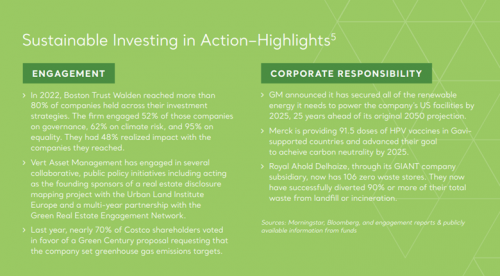Investing with Values: Thoughts on the Anti-ESG Movement
There has been much debate, both positive and negative, swirling about ESG investing. What has become known as the “anti-ESG movement” gained significant momentum in 2022. It is not uncommon for investment approaches to inevitably invite scrutiny, especially those that have gained increased acceptance among investors. Certainly, sustainable investing has its fair share of both diehard supporters and vocal critics. However, what started off as a rational discussion about its relative merits and potential drawbacks has morphed into a radicalized political debate. The debate has unfortunately moved from a reasonable analysis between investment practitioners into the realm of public policy, cultural norms, and morality. Recently, a state representative from North Dakota called sustainable governance “a worldwide human satanic organized effort.”1 How did we get there, and what does this mean for sustainable investors?
The crusade against ESG has been led by several states, particularly Texas and Florida. Additionally, a few high-profile politicians have become the voice of the anti-ESG movement. Their efforts have been focused on two areas: targeting entities that boycott certain industries and prohibiting the use of ESG factors in the investment decision-making process. Initially, the actions were directed primarily at large, well-known banks. More recently, public pension funds have been caught in the crossfire. In 2021, Texas governor Greg Abbott signed bills that banned municipalities from dealing with banks that restrict funding to fossil fuel or firearm companies. This February, Florida Governor Ron DeSantis announced legislation to protect Floridians from the “woke environmental, social, and corporate governance movement that continues to proliferate the financial sector” 2 calling ESG “a direct threat to the American economy and individual economic freedom.2 Many other states, including Kentucky, North Dakota, Mississippi, and Indiana, have passed anti-ESG legislation with varying levels of restrictions.
The critics of ESG maintain that corporate elites are using ESG criteria to circumvent the ballot box and implement a radical ideological agenda. Last year Woke, Inc. author Vivek Ramaswamy launched Strive Asset Management, a firm focused solely on investing through an anti-ESG lens. His aim is “to take politics out of business.” Other ESG opponents point out the practice of greenwashing and questionable ESG data integrity as reasons for skepticism. Additionally, critics believe that by using managers that consider ESG criteria in their investment processes, public pension fund sponsors are violating their fiduciary duties. violating their fiduciary duties. While we concur that greenwashing and data integrity are legitimate concerns (topics we have covered in past issues), the claim that considering ESG criteria is a violation of fiduciary duty seems to us an unfair characterization.
Many investors argue that the opposite is true. ESG factors are often material, both to a company’s current profitability and its future prospects. If you were evaluating a semiconductor company, would it not be crucial to understand its water access and efficiency practices? Similarly, when investing in the apparel sector, isn’t understanding a company’s risks of a cotton crop dying from climate-induced drought important? Shouldn’t investors be mindful of the potential for product safety recalls for a drug company or data security and privacy breaches for a social media company?
While the anti-ESG movement has gained momentum, so has its own growing backlash. Interestingly, the pushback is not just coming from ESG proponents. Several states have recently outright rejected anti-ESG proposals or reduced their potency. Last month the North Dakota House of Representatives rejected (by a 90-3 margin) a bill that would have imposed restrictions on a list of financial companies determined to boycott the energy sector. Indiana, Mississippi, and Kentucky have defeated similar proposals. Recently, the Kentucky County Employees Retirement System wrote a letter to the State Treasurer stating that her requirement that the pension fund divest from companies deemed as boycotting the energy sector was “inconsistent” with the pension’s fiduciary obligations.3
There are two primary reasons for the growing anti-ESG backlash. First, government interventions may violate conservative principles of free markets. Referring to the rejected North Dakota bill, Rick Clayburgh, CEO of the North Dakota Bankers Association, stated “We believe our banks should be allowed to do business with customers they know, the people they know and to make those decisions.”1 The second reason stems from increased costs. When Texas drove out several large banks from its municipal bond underwriting, the reduced competition led to a material increase in costs. Indiana estimates that a bill requiring the state pension system to divest from firms engaged in ESG investing would cost $6.7 billion over the next decade, lowering returns from 6.25% to 5.05% annually.3
Morningstar recently wrote an article titled “10 Reasons ESG Won’t Be Stopped.”4 The piece affirms several positive attributes of sustainable investing, many of which we have discussed in past issues. The article also points out that criticisms should ultimately improve the efficacy of sustainable investing options and increase investor education. We believe investors should stay the course but be prepared for further headlines, particularly with an election year just around the corner.

For more on Sustainable Investing Solutions, read our primer here or our recent article in Worth magazine here.
Download the PDF version by clicking on the image below.
1. “The conservative battle against ‘woke’ banks is backfiring” (Washington Post, 2/28/2023)
2. flgov.com
3. “The Backlash Against ESG Faces Its Own Backlash” (Institutional Investor, 3/7/2023)
4. https://www.morningstar.com/articles/1123647/10-reasons-why-esg-wont-be-stopped
5. Certain public companies as well as certain funds of managers listed above may be held in Colony’s Sustainable Investing Solutions strategies. These are included for reasons unrelated to performance, past or future; rather, we want to showcase what we believe are some of their positive contributions in the sustainable investing space. There is no assurance that any listed security or fund manager will have exposure within Colony’s strategies in the future. Inclusion herein is not recommendation to buy or hold any security and no attempt is made to suggest that holding any security will be profitable to an investor.


